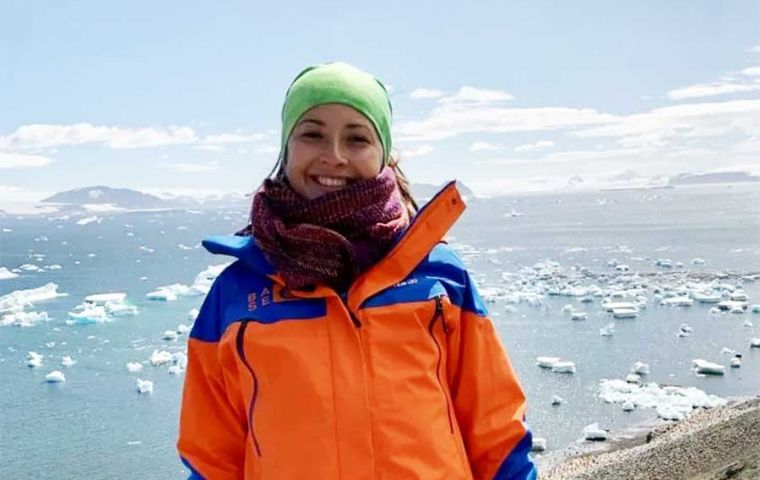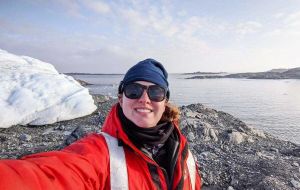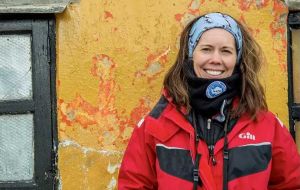MercoPress. South Atlantic News Agency
IAATO and COMNAP announce 2024 Antarctic Fellowships
 Lucila Belén Morales, a PhD candidate from Andrés Bello University in Chile
Lucila Belén Morales, a PhD candidate from Andrés Bello University in Chile  Dr. Katherine Gallagher from Stony Brook University, USA.
Dr. Katherine Gallagher from Stony Brook University, USA.  Amanda Lynnes, IAATO Director of Environment and Science Coordination
Amanda Lynnes, IAATO Director of Environment and Science Coordination The International Association of Antarctica Tour Operators (IAATO) (*), and the Council of Managers of National Antarctic Programs (COMNAP) have announced their selections for the 2024 Antarctic Fellowship. The annual Antarctic Fellowships, are an investment in the professional development of talented early career researchers.
IAATO has awarded eight recipients since it launched its fellowship in 2019 and COMNAP 21 since 2011.
IAATO has awarded US$ 9500 from its fellowship fund to Lucila Belén Morales, a PhD candidate from Andrés Bello University in Chile and US$ 5500 to Dr. Katherine Gallagher from Stony Brook University, USA.
Amanda Lynnes, IAATO Director of Environment and Science Coordination, said: “Lucila and Katherine’s exciting projects will involve multinational collaborations, equipping them with valuable skills and knowledge while having long-lasting impact within the Antarctic community and beyond.”
Lucila’s project proposal captured the attention of IAATO’s Science Support Working Group with her enthusiasm to better understand how skua species have genetically adapted to establish in the polar regions. She demonstrated passion for research that supports the ongoing protection of Antarctic wildlife, something that clearly resonates with IAATO’s own mission.
Lucila will be joining an expert team at the National Museum of Natural Sciences in Madrid, Spain where her skills in genomics and ecological modelling will be enhanced. The collaboration will also enhance our understanding of how skua populations might respond to emerging climate change scenarios.
Katherine intends to use physical oceanographic models to identify areas where krill, the keystone species of Antarctica, may be exposed to or consume microplastic marine debris. Penguins, seals, and whales depend on krill as an abundant food resource and the health of these tiny creatures is vital to conserving the continent’s wildlife.
She will travel to the British Antarctic Survey (BAS) in Cambridge, UK to collaborate on a project called ‘Modeling the spatial overlap of krill and microplastic hotspots on the West Antarctic Peninsula’. Katherine will use this visit to learn microplastics analysis techniques and create realistic parameters for their simulations.
It was in support of the Antarctic Treaty’s unique mission for peace and science that IAATO came into being 33 years ago with a mission of advocating and promoting the practice of safe and responsible Antarctic private-sector travel. In 2019 the association launched the Antarctic Fellowship with the intention to strengthen international capacity and cooperation in fields such as climate, biodiversity, conservation, humanities, and astrophysics research by providing annual funding opportunities for talented early-career researchers, scientists, engineers, environmental managers, and other professionals.
COMNAP has awarded its 2024 Antarctic Fellowship to María Cristina Casero Chamorro and Clara Álvarez Hernández.
Cristina is a postdoctoral researcher at the Universidad Autónoma de Madrid, Spain, and she will be hosted by the Czech Antarctic Program. This award will support Cristina’s project entitled “Understanding viral abundance and distribution from airborne samples in and around Johan Gregor Mendel Base, northern James Ross Island, Antarctica”.
Clara will join researchers at British Antarctic Survey with a project entitled “Exploring plastic waste removal options to minimize local introduction of micro-plastics in the Antarctic environment”.
(*) AATO has been carefully monitoring, analysing and reporting Antarctic tourism trends since 1991 as part of its commitment to the effective self-management of guest activities. Every year at IAATO’s annual meeting, members have open and candid discussions on safety, environmental protection and self-regulation. Decision-making is supported by re commendations developed by IAATO's many dedicated committees and working groups throughout the year. The meetings conclude annually with the voting in of new policies on best practice which support the association’s mission.



Top Comments
Disclaimer & comment rulesCommenting for this story is now closed.
If you have a Facebook account, become a fan and comment on our Facebook Page!